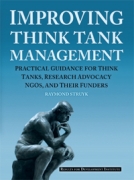A book on managing Think Tanks by Raymond Struyk was released by NCAER and the Washington DC-based Results for Development Institute (R4D) whose research program on think tanks has yielded the book. This publication demonstrates that better management is possible, cost-effective, and can be highly rewarding. It contains best practices, case studies, and strategies based on the experience of over 80 think tanks globally, drawing from the Think Tank Initiative, the Global Development Network, and the Think Tank Fund.
In this comprehensive guide, author Raymond Struyk encourages think tank managers to make improvements to increase efficiency and guides them through lowering the costs of making those improvements. The examples shared confront specific issues managers often experience, such as difficulty motivating staff, controlling project costs, assisting project leaders, and becoming more efficient with fundraising.
Dr Raymond Struyk is a Senior Fellow at R4D and currently Interim CEO at the think tank MDRI-CESD in Myanmar. He has led housing and finance development projects in Indonesia, Russia, Hungary, Egypt, and Eastern Europe. Struyk founded the international program at the Urban Institute, where he worked for over 30 years. He served as the Deputy Assistant Secretary for Research and Evaluation at the U.S. Housing Department in the Carter administration. He is also the author of Managing Think Tanks: Practical Guidance for Maturing Organizations.
The Book launch event was followed by a Panel Discussion on Evidence-based Policymaking: The Role of Think Tanks in South Asia. As the countries of South Asia grapple with multiple and often-conflicting public policy priorities in resource scarce settings, the need for solid evidence and analysis to drive policymaking has never been greater. At their best, think tanks generate evidence based on good data and credible analysis, influence public opinion, and help create the social and political conditions for better policymaking. The discussion tried to answer questions like, Are South Asian think tanks living up to their potential? What are the economic, political, and institutional constraints they face? How best can they be alleviated? How can governments and donors help?
Panellists included Arvind Subramanian, Chief Economic Advisor, Government of India, Swaminathan Aiyar, Consulting Editor of The Economic Times and author of popular weekly column called ‘Swaminomics’ in the Times of India, Abid Suleri, Executive Director, Sustainable Development Policy Institute, Pakistan, Shubhashis Gangopadhyay, Director, School of Humanities and Social Sciences, Shiv Nader University and Ray Struyk. Directors from the 14 South Asian think tanks that are a part of the global Think Tank Initiative also joined the discussion.









